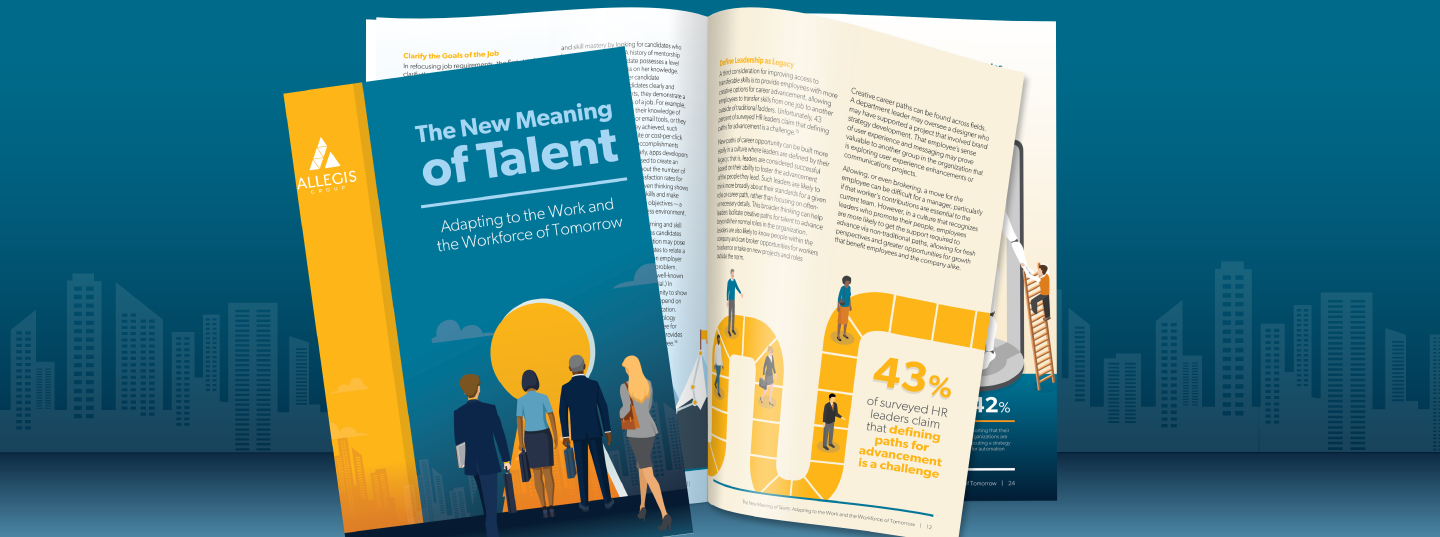Report: Workplace Trends and Survey Findings Indicate a Need to Adopt Flexible Work Models

We’re excited to release our latest research report, “The New Meaning of Talent: Adapting to the Work and the Workforce of Tomorrow,” which explores successful strategies employers are using to evolve their talent management practices and adapt to workplace trends that include low unemployment, talent scarcity, a multigenerational workforce, global sourcing, digital talent acquisition, and other factors.
The challenges of adapting to today’s workplace trends are very real. In fact, 94 percent of 1,000 HR decision-makers we surveyed for the report believe navigating talent management trends and challenges today is more difficult than it was five years ago, leading to core business issues. Among those who expressed difficulty, areas of impact include longer hiring cycles (50 percent), increased costs (49 percent), lower productivity (38 percent), lower workforce engagement levels (38 percent), limited achievement of business goals (33 percent), and loss of revenue potential (27 percent).
“The world of work looks significantly different than it did just a few years ago. Critical skills are scarce, demand is high, and new trends and innovations are changing the talent landscape every day. As a result, organizations are challenging old assumptions about the people they need to do the work, the trends that shape how they acquire talent and the evolving nature of the work itself,” said Andy Hilger, president of Allegis Group. “Talent strategies must evolve to stay ahead of change. It’s a priority that is important not only for the future of talent acquisition but for the success of the business itself.”
Amid Workplace Trends, Question Who Does the Work, How to Acquire Talent, and the Nature of the Work Itself
Considering the business issues at stake, addressing today’s talent trends is more than a nice-to-have ideal; instead, it is a priority that can determine an organization’s ability to survive and grow. To help shed light on the issues, we researched key trends and surveyed 1,000 HR decision-makers about their perspectives on how well their organizations are keeping up.
The resulting research reveals that talent is taking on a new meaning for companies today. Who does the work? How do companies secure the workers they need? What is the nature of the work itself? This report explores answers to these questions through the lens of six critical trends: the rise of the multigenerational workforce, the growing emphasis on transferable skills, the demands of multi-channel global sourcing of talent, the increasing focus on digital talent acquisition, the expanding use of flexible employment models, and a growing pressure to automate activities and processes.
Together, the issues point to a world of work where the traditional notion of the lifetime employee is no longer the norm. By asking the questions and exploring the approaches and strategies companies are taking to succeed, the research sheds light on paths to competitive success in the complex world of business and talent today.
Highlighted survey results among HR leaders surveyed regarding practices in place at their organizations include:
- 56 percent use different engagement models — from traditional employment to contractor, contingent worker or outsourced services — to their full potential, leaving 44 percent who still have work to do when it comes to utilizing all worker types.
- Most are embracing digitally enabled practices such as remote working, flexible scheduling, virtual meetings, and online chat, yet just 15 percent fully adopt all four.
- 30 percent cannot see the total demand for talent across the organization, 29 percent lack visibility into the total talent supply, and 34 percent do not have a central system to measure talent acquisition success.
- 42 percent have begun executing a strategy to map work processes or identify areas for future digitization and automation, yet 17 percent are years from considering a strategic approach to automation or are not even thinking about it.
“In our 35 years of delivering talent solutions, placing the right people in fulfilling jobs and adopting new technologies, we’ve found that the most successful workforce model is one that evolves with changing times,” Hilger said. “Companies are increasingly committed to a future-focused talent approach, and through our dedicated expertise, services and innovation leadership, we’re proud to be a part of that vision.”
Get More Insights: Download the White Paper
Find out how major workplace trends are pushing companies to rethink their talent strategies. Download your free copy of Allegis Group’s “The New Meaning of Talent: Adapting to the Work and the Workforce of Tomorrow” today.


